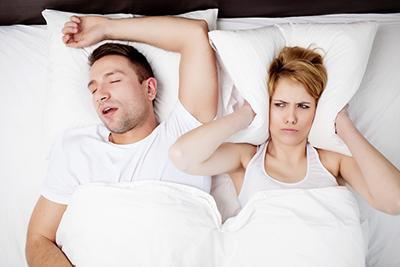
Could your snoring be a sign that you have this common sleep disorder?
Dragging yourself out of bed in the morning. Walking like a zombie to the coffee pot. Pounding coffee to try to clear the brain fog. Falling asleep at your desk. Feeling easily annoyed with everyone around you. Finding out from your partner that you were snoring loudly, again. If this sounds like you, it might be time to visit an ENT doctor for a sleep apnea evaluation.
What Is Sleep Apnea?
Obstructive sleep apnea is a sleep disorder that causes pauses in breathing throughout the night due to tissue collapsing in the back of the throat, which blocks airflow. This limited airflow and oxygen to the brain can lead to various health problems over time, some of which can be dangerous if sleep apnea is left untreated. The National Sleep Foundation reports that as many as 85 percent of people with sleep apnea don’t even know they have it.
What Are the Warning Signs?
You could have sleep apnea if you are dealing with,
- Loud, chronic snoring
- Gasping for breath or choking sounds
- Restless sleep
- Morning headaches
- Daytime fatigue despite getting enough sleep
- Mood swings
- Difficulty concentrating
- Brain fog
- Falling asleep at your desk or behind the wheel
- Needing a nap to get through the day
- Increased irritability
- Decreased sex drive
- Depression
When Should I Turn to an Ent Doctor?
Most people seek an ENT doctor for an evaluation because their partner is complaining about their loud snoring, night after night. Of course, if you are experiencing any of the symptoms above, it’s worth turning to an ENT specialist for a proper evaluation to determine if you could have sleep apnea.
Sleep apnea is diagnosed through a sleep study, which you may be able to complete from the comfort of home. If you suspect sleep apnea in yourself or someone you love, it’s vital that you schedule an appointment as soon as possible.
How Is Sleep Apnea Treated?
CPAP therapy is still the standard way to treat obstructive sleep apnea, requiring the individual to wear a mask over their nose and mouth while sleeping. During the night, the mask pumps pressurized air into the airways to keep them open. CPAP much be worn every night.
Mild to moderate forms of obstructive sleep apnea may also be treated with a simple oral appliance to keep airways open while you sleep. This device may also benefit individuals who aren’t candidates for CPAP therapy.
While surgery can also be used to treat sleep apnea, before considering surgery, you may want to consider the newest sleep apnea treatment—a subdermal device that is placed directly under the skin and you turn on and control with a remote. You turn it on before going to bed, and the device will stimulate the muscles of the airways to keep them open.
If you suspect that you might have sleep apnea, you must turn to an ENT doctor who can perform the appropriate tests and provide you with an immediate diagnosis so you can get the treatment you need. You’ll be amazed at the relief you feel and how refreshed you can feel day in and day out when your sleep apnea is fully controlled.
